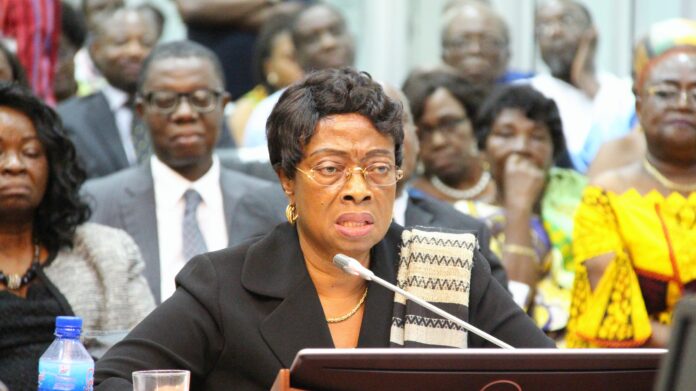Sophia Abena Boafoa Akuffo, a former Chief Justice of Ghana, has noted that although certain things are not codified as unconstitutional, it does not suggest a public officer can do them.
Quoting the famous Biblical utterance of Jesus, Madam Akuffo has advised public officials, especially politicians, that “even in the Bible, it says I can do all things, but not all things are good.”
Her comments come on the back of the recent attempt by the government to sell off the Social Security and National Insurance Trust’s (SSNIT) 60 per cent shares in some four hotels to a government official.
Until a revelation by the Member of Parliament for North Tongu, Samuel Okudzeto Ablakwa, which forced Organised Labour to go on strike for government to rescind the decision, the four hotels would have been sold to the Minister of Agriculture, Bryan Acheampong.
Reacting to the issue which many have described as state capture, the former Chief Justice noted that the botched transaction was uncalled for, stating that conflict of interest as the government has defended was not the case, is sometimes about ethical standards.
In a yet to be aired interview with Alfred Ocansey on Ghana Tonight Thursday, July 25, 2024, Madam Akuffo stated that one cannot be a lawyer and a judge in the same case.
“You can’t be the judge and the jury. You can’t be the lawyer and the judge. You can’t be the litigant and then you are also sitting, you know, after you’ve given your evidence and everything and it’s time, your lawyer has done the submission and it’s time to determine the outcome, then you are now going to go and sit among the jury and you are part of that,” she stated in relation to the transaction.
She explained further that “conflict of interest is not defined by the individual, and sometimes, yes, conflict of interest, when you are managing standards, it’s part of performance standards. And when you are managing those, those are called ethical standards.”
“When you are managing ethical standards, sometimes it is simply perception. Will a reasonable man in the street, in law school, we say, ‘will the reasonable person on the Laterbiokorshie bus, if you were to tell them of this, what will they say about it?’ And if you can surmise that they will say, it smells, then it smells,” she added.
She counseled that a public officer does not need a law to know what is right or wrong.
“And when you are a public person, just because there is no law that says you cannot do it, does not mean you should do it. Even in the Bible, it says I can do all things, but not all things are good.”













